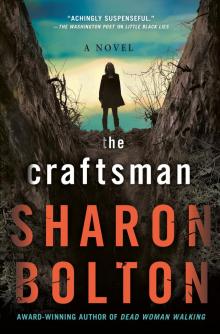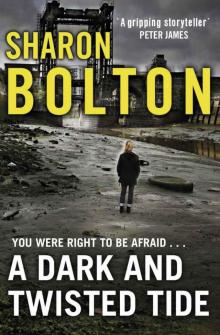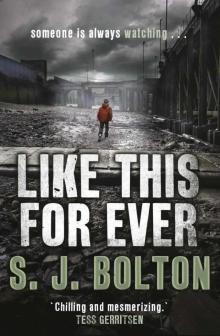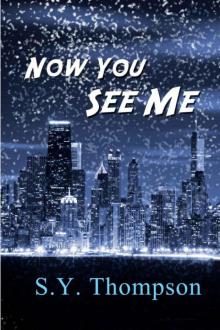- Home
- Sharon Bolton
The Split
The Split Read online
Begin Reading
Table of Contents
About the Author
Copyright Page
Thank you for buying this
St. Martin's Press ebook.
To receive special offers, bonus content,
and info on new releases and other great reads,
sign up for our newsletters.
Or visit us online at
us.macmillan.com/newslettersignup
For email updates on the author, click here.
The author and publisher have provided this e-book to you for your personal use only. You may not make this e-book publicly available in any way. Copyright infringement is against the law. If you believe the copy of this e-book you are reading infringes on the author’s copyright, please notify the publisher at: us.macmillanusa.com/piracy.
For Lupe, who makes me laugh and keeps me fit.
Part One
SOUTH GEORGIA
Present Day
‘Lands doomed by nature to perpetual frigidness: never to feel the warmth of the sun’s rays; whose horrible and savage aspect I have not words to describe.’
Captain James Cook, 1775
1
It’s not a ship. It’s an iceberg. Oh, thank Christ. She drops her binoculars and feels a thudding in her chest that might be her heart starting to beat again. There is no smoking allowed on the island, but she pulls out her cigarettes all the same, because if she can subdue the shaking in her hands for long enough to light one then she might feel like she’s in control again. The wind, though, won’t let the flame catch.
She checks the horizon again. The speck in the distance is still ice, floating east into the vast, cold emptiness that surrounds the Antarctic.
The ocean is troubled today, steel-grey as the sky and broken like shattered glass. Storms come so fast here, and sunshine turns black in the blink of an eye. The bad weather will be working in her favour, slowing the ship, but not for ever.
The last ship of the season. One more and she’s safe.
She thinks of the fear inside her like a cancer, eating away at muscles, organs, bone, growing all the time, until there is nothing left of her but a rotten, stinking mass in skin stretched like an overfilled balloon. How will the terror burst out, she wonders, when it inevitably does. A scream? A petrified whimper?
An alarm sounds on her phone, letting her know that life doesn’t stop, even when it’s on the brink of ending. She turns to walk back, knowing that she’s running out of places to hide.
The ends of the Earth. That’s how far she ran this time.
Not far enough.
2
Felicity
On a morning in late March, the end of the summer in the southern hemisphere, a woman stands high on the Konig Glacier on the island of South Georgia. She is as tall as an Amazon, with the long silver hair of a Nordic princess and a delicate prettiness that is quintessentially English, but none of that is visible for now. The thermal diving suit she wears renders her sexless and featureless, indistinguishable from the man crouched nearby on the ice. As he goes about his business, checking air tanks, valves and weights, Felicity stares into the depths of a glacial blue lake.
Beneath her feet, the packed snow groans as she moves to the water’s edge. The ice around her is so white, so bright, it burns her eyes, but the lake is the iridescent blue of liquid sapphires. Its depth is immeasurable, compelling and terrifying at once. It is like looking into eternity.
Her eyes drop to the letter she is holding.
My dearest Felicity,
Finally, I’ve found you. South Georgia? Wow! Know, my darling, that there is nowhere you can go that I won’t follow—
A hand lands on her shoulder and she leaps around in fright.
‘Sorry, sorry.’ Jack takes a startled step back. ‘Only me.’ He lowers his voice. ‘Are you all right?’
There is a lump in her throat that won’t seem to swallow away. ‘I’m fine,’ she croaks. ‘Just nervous.’
Jack’s eyes narrow before he bends to the ice. ‘You dropped something. You know this is going to get wet, don’t you?’
He’s got the letter.
‘It’s fine, I’ve got it. Please?’ Felicity grabs it back and bends to tuck it into her kit bag.
‘Flick, what’s up?’
She has to get a grip. She has time. She’s prepared, even if the worst happens. She just has to get through today.
As she straightens up, Jack’s voice is still pitched low, so that only she can hear him. ‘Flick, seriously. I can do this myself. You can talk me through it from here. You don’t have to—’
Normally, it isn’t hard to smile at Jack. His face is so open, so kind, so entirely dependable. Today, though, she can’t even force it.
‘I’m fine,’ she says. ‘Let’s do it.’
She takes her comms equipment and a few seconds later the sound of wind on snow becomes that of radio static. Jack hands over her mask and she waits a moment before fixing it in place, as though this might be the last time she sees the horseshoe of snow-capped mountains, the pale turquoise sky, and the shadow of albatross wings over silver ice.
‘Can you hear me, Flick?’
The voice in her ear-piece is that of their team mate, Alan, twenty yards back from the lake edge. He will direct the dive from the surface.
‘Loud and clear.’ Felicity allows Jack to lift the oxygen tanks onto her shoulders.
‘Konig Glacier team to King Edward Point,’ she hears. ‘22 March, 0915 hours. Flick and Jack are going down now. Thirty-minute dive to position depth sensor and underwater camera. Conditions good.’
‘Take it easy,’ comes the reply from base. ‘No unnecessary risks.’
‘You ready, Flick?’
At her signal, Jack steps out and a blue wave swallows him up. Felicity follows and falls into a world of pain. Cold-water shock. She forces her breath in and out and waits for it to pass. When she is calm enough to open her eyes, she sees Jack taking hold of the underwater camera. She looks up, sees the depth sensor being lowered, and grasps it.
‘Time to get moving.’ Jack’s voice, rasping over the comms system, is unrecognizable.
They leave the surface and are consumed by a world of blue and white, in which the only sound is that of heavy, laboured breathing. Felicity and Jack follow the ice wall down, their headlights picking out fantastical shapes. Faces peer at them, animals from legend spring and coil in the ice crevasses.
The blue lake, which forms every spring from meltwater, has been steadily accumulating for five months now. Sometime in the next few weeks, possibly even today, the ice of the lake’s bed will fracture. The lake will drain, sending a hundred thousand cubic metres of meltwater through an intricate, hidden drainage system until it reaches bedrock. From there, it will flow out into the southern Atlantic ocean. The release of so much water might be the trigger that forces the ice to break apart, to send another massive iceberg tumbling into the sea. Blue lakes, it is believed, play a crucial part in the movement of glaciers and the creation of bergs.
The alarm sounds on Felicity’s depth gauge. She and Jack have reached the flat shelf of ice that will hold both the camera and depth sensor to measure movement in the lake over the next week. She hovers in the water, and takes her time fixing the instruments in position.
‘I’m switching on, Alan,’ she says.
‘Hold on. Yeah, we’ve got it. Looking good, Flick. What’s it like down there?’
Jack, she sees, is some way below, his suit ghostly pale against the blue depths.
‘Not sure I’ve the words,’ she tells Alan.
Jack is coming back. He swims fast, as much at home in the water as the millions of seals that live around South Georgia.
‘What do you think?’
he says, as he draws level. ‘You up for it?’
It is her idea. It, though, seems a very different proposition now that she is in the heart of the lake. It could be very dangerous.
On the other hand, there are worse places to die.
‘What’s up, guys?’ Alan’s voice crackles at them from the surface.
‘We’re thinking of having a quick look for the plug hole.’ Jack holds eye contact, waiting for her answer.
The plug hole is a theory, completely unproven, that, at the deepest part of the lake’s bed, a weak spot of ice lies directly above a central drain.
There is a hiss of static in her ear and Alan says, ‘I don’t know, Jack. It’s clouding over up here.’
Weather changes so quickly in South Georgia, even in summer.
‘Your call, Flick,’ says Jack.
If she dies today, it’s over. No more running. No more hiding.
Felicity puts a finger to her lips. She feels, rather than sees Jack’s smile and then she flips.
‘Guys, what’s going on?’ Alan’s voice is breaking up.
Directly below, Felicity sees the ice forming a conical shape.
‘Reckon that’s it?’ Jack asks.
‘Guys, we’ve got movement on the surface. Air bubbles that aren’t coming from you two.’
Felicity and Jack stop swimming and look at each other. Other bubbles could be caused by movement on the lakebed. Were it to fracture now, draining the water, the two of them would be sucked into the glacier. They would die in an icy grave or be swept out into the Atlantic.
They hear Alan’s voice again. ‘Doc says I’ve to pull you up. Ten seconds, then we’re winding you in.’
Felicity reaches behind and unhooks her safety line. She feels Jack’s hand brush her ankle as he tries to catch her and misses. Her head begins to throb as she swims lower and it might be her imagination, but breathing seems to be getting harder. She focuses only on the dark blue cone at the lake’s inner core, hears crackling on the radio and thinks she can make out Jack asking for a few more minutes.
When she is only a few feet above the blue circle she pulls a small plastic bottle from the pouch around her waist. As she loosens the top, a crimson liquid bursts out like a fleeing genie. It hangs in the water for several seconds and then blooms like an alien flower, spreading slowly in the almost non-existent current.
Then, it begins to spiral, like water draining from a wash basin. It goes slowly, little more than a trickle, but there is definitely centripetal movement.
‘Flick, we need to get out of here.’ Jack has swum down to join her. ‘My airways might be icing up.’
Felicity can’t breathe easily any more but that seems less important than what she’s learned. This is definitely the plug, and the water is draining already. It isn’t apparent on the surface because enough meltwater is replenishing the levels but when the plug disintegrates, the lake will empty rapidly.
Jack clips her safety line back on.
‘We’re done, Al,’ he says. ‘We’re coming up.’
* * *
When they are ready to leave the glacier, Felicity stands on the edge of the lake once more, with Jack, who is holding the video camera. Over one shoulder she has a bag filled with nearly a hundred small orange plastic balls.
‘Sometime in the next few weeks,’ she says to camera, ‘the lake will drain. The equipment we’ve just installed will alert us to it happening, and there’s a chance we can get over in time to film it. These balls might allow us to trace where the water meets the ocean.’
She lets them fall into the lake and they spread out over the surface of the water like sweets on a child’s party cake.
‘Are we done?’ Jack asks, as she bends to gather her equipment. ‘I’ve some stuff arriving on the boat.’
Felicity stops moving. ‘What boat?’
‘Last boat of the summer. The Snow Queen, I think. Why, what’s up?’
‘That’s not today.’
‘It is, if today’s the twenty-second. Seriously, are you OK?’
Felicity resumes packing, faster now, and not nearly so carefully. ‘Yeah, just cold,’ she manages.
She’s got it wrong. The boat is coming. The boat is coming today.
3
Freddie
‘Good morning, sir. Have a seat.’
The ship’s doctor is young, a thin, sandy-haired man who probably can’t grow a full beard. Unlike the other ship’s officers, he isn’t wearing uniform but has opted instead for chinos and a sweater. He holds out a hand for Freddie to shake.
‘We passed our first berg this morning? Did you see it? There was a whole gang of us on deck at first light. I didn’t notice you there but, as I say, there were a lot of us.’
Freddie sits.
‘Massive thing.’ The doctor is still on his feet. ‘Must have been fifty metres high. I’ve done this trip twice now and I’m not sure I’ll ever get used to them.’
‘I was in my cabin,’ Freddie says.
‘It’s the colours I can’t get over. People talk about bergs being white but, I tell you, there was a blue near the water’s edge that was pure copper sulphate. And the noise they make – how can a lump of ice make so much noise?’
‘Mainly, you’ll be hearing millions of trapped air bubbles being released as the ice melts,’ Freddie tells him. ‘A sort of fizzing and crackling, was that it?’
‘Exactly. And a groaning. It was actually a bit unearthly.’
‘The ice will be breaking apart and moving within the berg.’
The doctor makes a puzzled face. ‘You’re very well informed.’
‘I’m a geologist. Ice isn’t really my thing, though.’ Freddie looks at his watch.
‘What can I do for you this morning?’ the doctor asks.
Freddie unbuttons his shirt. ‘I have a recurring, low-grade abscess that might have flared up again. Lower back, right-hand side.’
Without being asked, he stands and pulls off his shirt. The air in the medical centre is cool, but everywhere on the ship has chilled down since they left the Falkland Islands three days ago to travel south. The heating does its best, but every time a door opens, a blast of cold air races in.
Freddie feels cold fingers pushing into his skin a few inches to the right of his spine. ‘Is that painful?’ the doctor asks.
‘Yep.’
Freddie feels the other man’s breath on his skin.
‘How are you feeling otherwise? Sweating more than usual? Dizzy spells?’
‘Like I’m coming down with flu. Alternating hot and cold, aching, sweating a lot at night.’
The doctor doesn’t reply.
‘I’ve kept to my cabin for three days,’ Freddie adds. ‘Just in case. But I have an infection. I’m not infectious.’
Cold fingers touch him again. ‘This is a nasty wound.’
Freddie says nothing.
‘How old is this scar?’
‘Three years, pretty much to the day. My last doctor thought some foreign body had been left behind. Not metal, that would show up on X-rays. More likely wood, or a scrap of clothing. Every now and again it flares up, but they didn’t want to operate because of the proximity of the kidney.’
He should have worked it out by now. A badly healed scar, no access to decent surgery. Freddie will despise him for a fool if he hasn’t.
The doctor is no fool. Lightly, he touches Freddie’s right arm.
‘May I?’ he asks, as he raises and straightens it.
Freddie waits while the doctor examines the tattoo. A spider’s web, encircling his elbow and reaching several inches along both upper and lower arms. An elaborate design, because time hadn’t been an issue, drawn entirely in black, because colours weren’t available.
‘It symbolises boredom,’ Freddie says. ‘Sitting around for days on end with nothing to do. Spiders make webs on limbs that don’t move.’
‘I know,’ the doctor replies. ‘I’ve seen them before. You were stabbed, weren’t you?�
�
‘In the prison library. Most of the blood spatter went over the crime-fiction shelf, but they threw thirty books out all the same. Shame really. We never had enough to read.’
The doctor thrusts a thermometer towards his mouth, as though to shut him up.
‘Can you help?’ Freddie says, when his temperature has been taken. Slightly raised, nothing to get excited about. ‘With the abscess, I mean. I realise the tattoo is permanent.’
‘Lie on the couch, please,’ The doctor says. ‘Face down.’
Freddie does what he is told. It’s a habit he’ll probably never shake off now.
‘I can drain, clean and dress the abscess and give you a course of antibiotics,’ the doctor says, to the accompaniment of rattling instruments. ‘When you’re home, you might want to consider some exploratory surgery, see if you can fix the problem once and for all. It should be easier now that—’
‘Now that I’m out,’ Freddie finishes for him.
The doctor works in silence. Freddie closes his eyes, feeling nothing once the anaesthetic has kicked in.
‘I’ll be OK to go ashore tomorrow?’ he asks, when he’s been told he can get dressed.
‘As long as you’re feeling well enough.’ Sitting at his desk, the doctor starts typing. ‘What brings you to South Georgia?’
‘There was a book in the library,’ Freddie tells him. ‘Written by a couple who’d sailed there in the 1990s in an engineless sailing ship.’
‘Fair play.’ The doctor makes an impressed face.
‘Exactly. I thought they were mental. And brave. So, when I had the chance to do a trip, I thought I’d come here. Honour their journey, if you like.’
‘It’s certainly a beautiful and unique place. Did you come via South America?’
The doctor will know this already. All the passengers on board are on a three-week package tour that will take them, ultimately, to the Antarctic. He has been helpful, though, and the last thing Freddie needs now is to become the target of official attention.

 The Split
The Split Daisy in Chains
Daisy in Chains The Craftsman
The Craftsman A Dark and Twisted Tide
A Dark and Twisted Tide Little Black Lies
Little Black Lies Here Be Dragons: A Short Story
Here Be Dragons: A Short Story Alive
Alive Like This, for Ever
Like This, for Ever Now You See Me
Now You See Me Sacrifice
Sacrifice